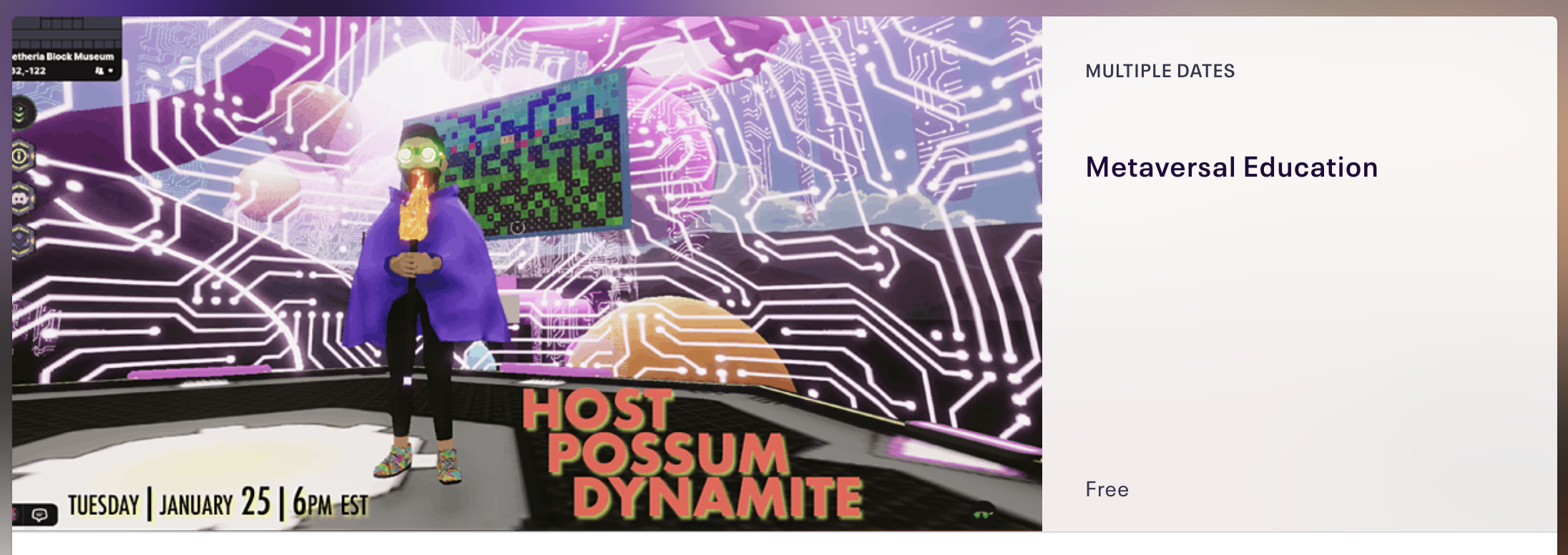Back to the fundamentals of people, metaverses, and DAOs

Click here to view this email in a web browser
Greetings all,
In this week’s episode of Ventures, my guests Linda Olson, Laura Yunger, and I discuss the often-overlooked value of people and communication alignment when building and investing in businesses. This is an episode I wish I had 20+ years ago when starting out my entrepreneurial career. Based on their extensive experience coaching and investing in entrepreneurs, Laura and Linda also talk frankly about how to avoid burnout and stay maximally healthy with your team.
Metaverses
Similar to Web3 itself, defining “The Metaverse” or “Metaverses” is not an easy thing to do. There have been aspects of metaverses (e.g. in gaming, AR/VR, etc…) that have been in existence for decades.
While obviously Facebook made some noise last year with their Meta name-change announcement, some of the more interesting metaverse projects (e.g. Decentraland and Sandbox), exist in an open and decentralized fashion.
Importantly, metaverses won’t just be for gaming. An increasing number of people already spend most of their lives online, and when (not if) Web 3 metaverses become mainstream, ownership of virtual land and virtual assets (NFTs such as land, shoes, clothes, tools, etc…) will become an unimaginably huge and creative market for all kinds of human (and not-so-human) experiences.
For further reading, check out:
- The Metaverse, Web3, and the Inevitability of NFTs (link)
- Why a decentralized metaverse is Web 3.0’s new frontier (link)
- Web3, Interoperability and the Metaverse (link)
- What Is Web3 and Why Are All the Crypto People Suddenly Talking About It? (link)
Fellow BanyanDAO member Josh Vitulli - who I interviewed about metaverses back in Episode 74 - also has a fantastic podcast episode he did recently here (“The Metaverse: Trend or Triumph?”) with Quantilus Innovation Podcasts that I’d highly recommend.
DAO Fundamentals
While some Web3 projects - especially those managing blockchains or huge open source projects - are an obvious fit for DAOs (Decentralized Autonomous Organizations), there remains a significant amount of ambiguity about how and why to start DAOs for other sorts of organizations. I’ve been writing/podcasting about DAOs for many months now (which I’ve captured together on Satchel here) and have recently merged all my recent DAO experiments into BanyanDAO (which you are more than welcome to join!). I’m now convinced that DAOs should be started for any organization where the founders are interested in scaling out the team and energy/momentum/progress quickly. However, this also means the founders should expect significant dilution of ownership right out of the gate, which has its advantages and disadvantages.
With BanyanDAO, we’ve recently recorded our last two weeks of meetings, help desk sessions, and marketing design brainstorming. You can find these recordings in our Discord server here in our specific project and workstream channels. It’s become clear that DAOs - for better or worse - can be an extremely rapid way to gather a lot of people to do a lot of work quickly.
Of course, the next question is: Why are people doing it? In Web3 right now there is a lot of curiosity, so understandably people are interested to dive in for the sole purpose of learning and building community. Those are certainly valuable aspects of “compensation” in and of themselves for people’s time/energy/thoughts/work, but the key new addition to Web3 is - of course - token models.
In BanyanDAO, we are issuing our first tokens in the beginning of March to everyone doing work via Coordinape. You can learn a ton more about the approach via their docs here, but in essence it works by allowing every member of the DAO to give a defined amount of tokens to whomever they choose to give them to in a defined amount of time (an “epoch”). For BanyanDAO, our first epoch is going to include all the past work up through Feb 28, 2022. Each member will have 10k worth of tokens to distribute to anyone in the DAO they choose to give them to, and a person will only be able to receive tokens if they participate in giving them away.
Importantly, the official membership of our DAO for the next couple of weeks - and the token ledger - will be recorded simply via a set of public Ethereum addresses in Coordinape plus the number of tokens people receive in the first epoch. From there, we’ll summon a DAO (likely on DAOHaus) and copy the ledger from Coordinape’s systems to an “on-chain” mechanism via Gnosis Chain (an Ethereum sidechain).
Coming back to the fundamentals, then, requires a careful look into how projects will be managed, who makes decisions, how we’ll hold fast to a common vision, and how everyone will be compensated. In the DAO space right now it is incredibly easy to over-engineer everything (given the temptation to create complex token models). Instead, with BanyanDAO we are starting as simply as possible, and we’d love for you to join.
Have a great rest of your week!
~Will